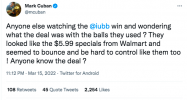Iowa pretty clearly deserved to lose, for a variety of reasons that had nothing to do with the refs, and this isn't sour grapes about why they lost. However, the officiating in this tournament (and for as long as I can remember in college) has been awful and renders many of the games unwatchable.
I watched the Baylor/UNC game through the end of regulation and, while UNC absolutely choked, the refs allowed Baylor to mug UNC on every press and trap during their comeback. Mayer from Baylor should have picked up his fifth foul many different times in regulation for grabbing, hip-checking, and humping every ballhandler into the out-of-bounds or half-court lines. And offensive foul calls throughout college basketball are atrocious. Flopping gets rewarded almost every single time. Jay Bilas tweeted criticism about this particular game's officiating and there also was a scathing opinion piece on USA Today's site about how bad it was.
But, to the point of this thread, I'd say this tournament has revealed or highlighted a few things that severely diminish NCAA basketball as a product and simultaneously pose problems for the Hawks:
1) The officiating is awful and rewards teams in the postseason that reach, grab, flop, and outright assault opponents. That's not playing "physical" defense, it's fouling. There are rules designed to prevent that, if the officials choose to enforce them consistently. But by trying to stay out of the way, swallow their whistles, and not be the story, refs inadvertently ARE becoming the story. Basketball sucks to watch (and play) when the less-skilled teams keep it close or even win simply because the refs allow them to turn every possession into a press-man coverage drill. Hell, football refs call more fouls for illegal contact than college basketball refs. The NBA realized this years ago and emphasized calling these types of fouls to increase freedom of movement, especially on the perimeter. Now, the NBA game is faster-paced, higher-scoring, and better to watch than when the Knicks and Pistons mugged their way through the playoffs back in the '90s and '00s and kept scores absurdly low. It's still very physical, especially in the post and on the boards, but it generally flows nicely and showcases the insane skills of its players. It's not perfect, of course, but it's better.
Iowa's offense resembles a lot of modern NBA teams, with its emphases on fast tempo, movement, and shooting. It's beautiful to watch when it's clicking, but it falls apart when the opposing team is allowed to stop that motion by reaching and grabbing all game. Teams that do this are being rewarded in this tournament and advancing, even when their offense is absolutely horrible. The only teams able to overcome this style are teams with elite talents throughout their rosters like Gonzaga and Duke, and even they might fall victim before long.
To be clear, while I don't like the way they do it, I can't really blame Iowa State or other teams for doing this. They're simply taking advantage of what the NCAA is allowing them to do and being rewarded for doing so.
2) The transfer portal has rendered program and player development virtually meaningless when it comes to the tournament. With the exception of minor-ish contributors like Rebraca, Fran has almost solely relied on homegrown players his staff has recruited and developed. I appreciate this about Fran and it makes it more rewarding when our players succeed, but it has its limits when there are clear needs on the roster, like this year's desperate need for better defense and dribble creation in a slugfest. A team like Iowa State was able to turn things around because they snagged a couple of free agents from the B1G (Brockington and Kalscheur) and emphasized "physical" defense to make up for horrible shooting and a lack of offensive cohesion. Why bother developing anyone anymore when you can just sign experienced players who are known quantities, then hack the shit out of opponents with impunity to keep games close? Hoiberg's ISU teams spearheaded the transfer trend, but now it's everyone's reality. Fran needs to adjust somewhat, or risk this same result every single year.

